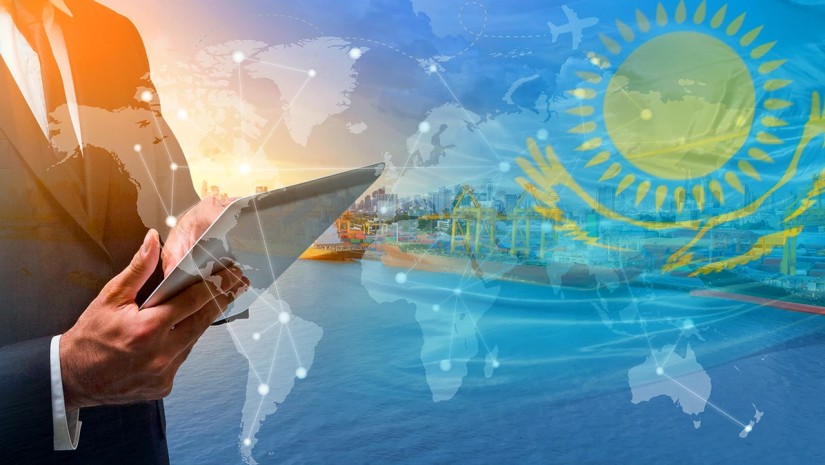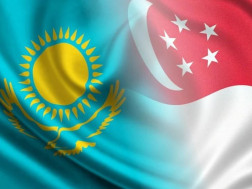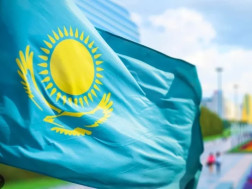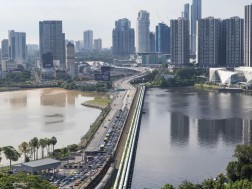Kazakhstan President Kassym-Jomart Tokayev will visit the island State of Singapore on a State visit on May 23 & 24th.
Minister Mentor & founding father of the republic of Singapore, Mr. Lee Kwan Yew created wealth and prosperity for all if not most people in Singapore by positioning the new and young country for a changing global world order and the idea of “globalization” after the sad and tragic war in Vietnam.
Singapore was once poorer than most of Africa but it is now it is among the richest countries in the world and the island state of Singapore gained and earned the trust of the world.
Kazakhstan and Singapore have more than 30 years of diplomatic relations based on trust, goodwill and mutual respect. These positive relationships are getting stronger and more reliable every year., the global capital market and investors should take note.
Since 2011, Singapore has invested approximately $1.26 billion directly into Kazakhstan's economy, supporting 13 projects valued at $642.6 million. Major Singaporean companies, including Surbana Jurong, PSA, International Cement Group, and others, have already established a presence in Kazakhstan. This demonstrates the recognition of both countries' market potential and the growing trade turnover between them.
Singapore's expertise in finance, technology, and innovation complements Kazakhstan's abundant natural resources, strategic location, and developing infrastructure. Through collaboration on joint projects and investments, both countries can leverage each other's strengths and benefit mutually.
For example, Kazakhstan is actively developing its digital economy and has launched initiatives to attract investments in this sector. Singapore, as a global technology hub, can contribute its experience and knowledge, opening opportunities for cooperation in areas such as e-commerce, fintech, and smart cities.
Cooperation between Kazakhstan and Singapore has a non-linear history and is imbued with deep contextual events. Two completely different countries, with radically different geographical, economic and cultural conditions, have managed to find a common language and are openly moving towards each other in the international arena.
The history of relations between the two countries cannot do without mentioning the name of Singapore's founder Lee Kuan Yew. His non-classical management methods, non-trivial decisions, and bold economic reforms have been studied by several generations of Kazakhstan's government and business community.
Lee Kuan Yew's bestseller and guide to nation building "From the Third World to the First" has been in the top book list of the Kazakh establishment for many years. At the dawn of independence, his image of a principled leader with a broad outlook and global authority served as one of the important ideological patterns for the young political wave of the early 1990s, post soviet union.
Therefore, it is not surprising that Lee Kuan Yew was one of the first global figures to visit Kazakhstan during the period of independence. In September 1991, the Singapore Prime Minister held consultations on the development of the Republic of Kazakhstan under the conditions of sovereignty and made an incendiary speech in the Supreme Council before the deputies.
Then Lee Kuan Yew shared his vision of an accelerated transition from a planned economy to market-based rules of the game and stressed that he was absolutely confident in the prospects of Kazakhstan. Perhaps these political blessings and practical messages have given the new republic additional optimism.
Kazakhstan is the world's largest landlocked country, and Singapore is a small equatorial port state on the edge of the South China Sea. By its size, the whole of Singapore is almost equal to the capital of Kazakhstan, Astana (about 800 square kilometres). In other words, the authorities of the two countries usually face completely different tasks and tools for solving them.
Nevertheless, the countries managed to overcome the" barrier of alienation " quite quickly, when it became clear that the uniqueness of each partner gives a cross-effect. Thus, Kazakhstan's oil is critically important for resource-deprived Singapore. In addition, the key Eurasian trade corridor – the Trans-Caspian International Transport Route (TMTM) - passes through this region, as well as the large-scale Belt and Road initiative is being implemented.
In turn, Kazakhstan sees the city-state as a strong financial centre of Asia, a source of international investment and a profitable sea trade route. Singapore accumulates a significant share of global capital, which means that here you can always find "long money" and reliable companies for Kazakhstan projects.
Today, the Kazakh-Singapore trade turnover is about $ 2 billion a year. Data is regularly growing primarily due to oil supplies, but gradually relations are diversifying. In particular, this is due to 140 Singapore and joint ventures operating in Kazakhstan in the fields of transport, logistics, digital technologies, food production and education.
Thirty of these companies, by the way, work on the site of the Astana International Financial Canter, where business cooperation is regulated by UK British common law. The total volume of investments attracted from Singapore is about $ 1.5 billion.
With these results, Kazakhstan has become Singapore's main partner in Central Asia. That is why the first – ever official visit of a Singaporean President to the Central Asian region took place in Astana-Halima Yacob did it last year. Mr. Tharman’s predecessor called Kazakhstan a regional leader and an extremely valuable partner, for Singapore and indeed the world.
During those talks, in addition to discussing specific projects, Singapore’s ex-president provided some valuable insights.
First, she drew attention to the fact that President of Kazakhstan Kassym-Jomart Tokayev worked in the diplomatic service in Singapore back in the 1970s and saw with his own eyes the complex process of the birth of the Republic of Singapore. H. Yacob made it clear that Mr. Tokayev's personal involvement in Singapore's historical processes is crucial for the country's political and economic circles.
Second, she was very clear about the recent mood in Singapore's business environment. Local businessmen, in her opinion, have become much less risky and do not want to come to unstable markets. They are willing to receive reduced profits in exchange for the predictability and security of their capital. Thus, thanks to the growing cooperation, Kazakhstan can act as a fairly mature and safe market in the eyes of Singapore investors.
Third, H. Jakob welcomed the consolidation of the values of justice, openness and order in Kazakhstan's society. In ex -president Halimah’s opinion, adherence to these principles increases the international image of Kazakhstan and brings it closer to Singapore. Thus, the warm socio-economic and political relations between the two countries have been strengthened by the synchronization of the main moral vectors.
On the other hand, it is premature to say that international relations between Kazakhstan and Singapore have reached a trade and economic singularity and are at the highest point of development. There is definitely a lot to strive for and something to radically change.
For example, it is important to expand the export package and significantly dilute the oil dominance with products of high processing, digital technologies, and intelligent services. To do this, it is important to open more joint ventures and increase cooperation between financial institutions.
If we have something more specific in mind, Singapore investors first of all pay attention to the transport routes of Kazakhstan and the opportunity to join the Middle Corridor of the TMTM. Thus, a number of Singapore companies express their desire to work on major infrastructure projects in Kazakhstan, for example, modernization of dry ports and improvement of logistics processes.
Indeed, through such projects, the two countries have the opportunity to increase foreign trade, attract investment funds and open new sustainable transport routes. The conditions that seemed uncomfortable at the start have turned into obvious advantages after thirty years of interaction.
As American President John F. Kennedy once aptly put it, "Every accomplishment starts with the decision to try."
Kazakhstan should always be its own best but close and increased co-operation with the republic of Singapore its human capital and financial resources and global investment capital entrusted to Singapore will benefit the common prosperity of both nations and investors willing to take note.
Rainer Michael Preiss is a founding member of the Kazakhstan Singapore business council & investment advisor Partner & Portfolio Strategist at Das Family Office in Singapore
















